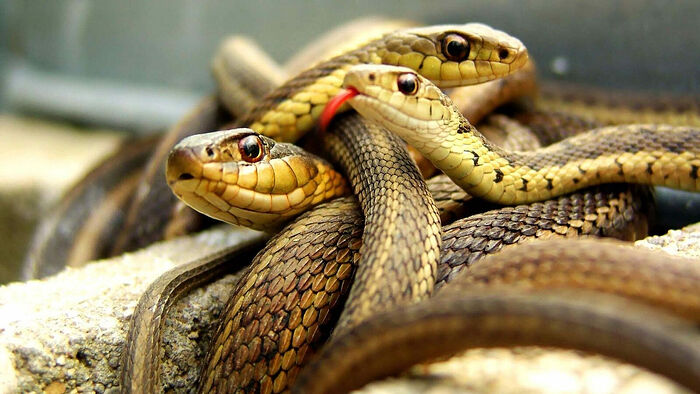This classic treatise by the modern Russian saint, Seraphim (Zvezdinsky), is a must read… and reread!
But the Holy Fathers count eight main sins, while the rest of the sins are only the tongues of these eight serpents, only their poisonous teeth.
The first serpent is gluttony. This is primarily all kinds of excess in food and drink: overeating, drunkenness, and pleasing the palate. This serpent has many tongues and teeth, often very subtle and inconspicuous. Every kind of care for the flesh, self-gratification—these are the tongues of this poisonous snake. But the most important of them is self-love, when a man thinks and cares too much about himself, about his own comfort.
The second serpent is lust. According to the Apostle, it is a shame even to speak (Eph. 5:12) of its teeth, but according to my archpastoral duty, I will name and show you these terrible teeth: One of them is fornication, the violation of chastity; the second is adultery. This tooth breaks the tunic of marriage. When the husband violates his fidelity to his wife, or vice versa, then know that it’s the work of a tooth of the second serpent. But it has other teeth as well—the unnatural vices. We won’t speak about them, because it’s shameful. All of these snake teeth are disgusting. To those who are given over into their power, the Apostle addresses these words: “Know ye not that you are Christ’s, and your body is the temple of God” (cf. 1 Cor. 6:19). Whoever gives himself into the power of the second serpent destroys and desecrates this temple. The second serpent also has more subtle teeth, about which Christ said: That whosoever looketh on a woman to lust after her hath committed adultery with her already (Mt. 5:28). This is how strict Christ is about purity, and there is no harder struggle than with the evil young of this terrible serpent. In this struggle, we have to ask for help from the Most Pure Virgin Mary, more honorable than the cherubim, more glorious beyond compare than the seraphim, and more pure than the radiance of the sun.
The third serpent is avarice, love of money, the passion for profit. A man possessed by this passion no longer has space for Christ in his soul; he has no time to think of salvation, because he’s always in dismay, in a state of anxiety about how not to miss out on some treasure. This serpent has one very sharp tooth, which bites quite often now: being overwhelmed with cares. What am I going to do next year? How will I live? How will I live in old age? People don’t think that the Lord knows our needs before we entreat Him.
Closely related to the third serpent is the fourth—anger. This serpent has many teeth. The first is irritability. People don’t agree with us and we get angry, we shout, we reproach, we get more irritated, it forces us to swear, often with evil, disgusting words; we forget then that we’ll have to give an answer on the day of judgment for every rotten word. Sometimes it’s even worse: We not only berate our brother, but we even kill him, either with a word or a look. Yes, my friends, you can kill a man with a look. It’s hard when the tooth of this serpent pierces into the soul; the soul becomes gloomy, coldness seizes it; and joy leaves the soul of an angry man.
The fifth serpent is sadness. There’s godly sadness—the sadness that makes us lament and weep over our sins—the sadness of the saints; but there’s another sadness—sadness over the things of this world. This serpent has two sharp teeth—murmuring and melancholy. Everyone’s living well—only I’m struggling—and here is murmuring and sadness. Do you really not know why you’re living like this? Yet more terrible are the teeth of melancholy, which leads to despair in the mercy and power of the Lord. Despair is the sin of Judas Iscariot.
The sixth serpent is despondency—it can be called paralysis of the soul. When the body is paralyzed, its individual members lose the ability to act—the eyes don’t see, the ears don’t hear, the feet don’t walk, the hands don’t work; in a word—life practically stops. The same happens with the paralysis of the soul: All its vital power grows scant, prayer is out of sorts, you don’t want to work on yourself, and the soul seems to fall into a heavy sleep.
The mighty seventh serpent with its many offspring and its surprisingly subtle teeth is called vainglory. There’s hardly any man on earth who could say of himself: “I’m not vainglorious, because I know I’m worse than all.” Vainglory is a futile, baseless glory. Man is vainglorious about his intelligence, his talent, his handsome face, the richness of his clothing and furnishings, his mind, his knowledge, his erudition. The most terrible thing is that even great ascetics have suffered from this tooth, because one can also be exalted by asceticism. Suddenly, during prayer, he says to himself: “People can see what a man of prayer I am,” and he’s already been exalted and bitten by the snake of vainglory. I repeat, even great ascetics weren’t free from thoughts; though it’s true, they are only thoughts, as it was with St. Seraphim [of Sarov]. When he refused to leave the Sarov Monastery and accept the rank of abbot, but returned to his squalid cell in the desert, he felt a vainglorious thought arising in his soul. The great elder, full of humility, punished himself for this thought: For a thousand days and a thousand nights he begged God for forgiveness for this thought. The vain man forgets that everything he has isn’t his, but the Creator’s. The vain man often treats others with disdain, and greets any resistance with irritation. See then that you walk circumspectly (Eph. 5:15) [Slavonic: “See then, for you walk dangerously”.—Ed.].
The eighth serpent is pride. This is the sin of satan himself. Pride leads to many sins, and the most terrible of them is godlessness, followed by the death of the soul.
We have examined the eight serpents of our souls; these are mortal sins, because the soul possessed by them dies a slow death...
Though there be serpents in your soul, Heavenly flowers will also grow there, which the serpents fear.
The first serpent—gluttony—fears the flower of temperance.
Lust is unable to bear even a tiny dewdrop from the flower of chastity, of purity.
Avarice fears charity.
Anger is slain by the wonderful flower of meekness.
Sadness—by an unspeakable joy of the Holy Spirit.
Despondency—the flowers of patience.
Vainglory can’t bear the Heavenly beauty of the flower of humility.
The last Heavenly flower kills pride and all its young with but the smallest dewdrop, like a terrible poison. The name of this wonderful flower is love. Love for Christ is the most wonderful, the most beautiful flower of our soul. Whoever has had this flower bloom within him has eternal joy. Ascetics labor to find this flower, renouncing all worldly blessings; the holy martyrs have poured out their blood for this flower. He who understands how beautiful this flower is will spare nothing to acquire it, will give all the strength of his soul.
One ascetic called out to Christ for thirty years: “Give me a drop of love.” And after thirty years of prayer, the Lord heard him. The elder became seriously ill, and during his very difficult trials, a most pure drop from a Heavenly flower fell into his heart, and such blessedness seized his soul that he blessed his sufferings.
Lord, we beg Thee, send down a drop of love into our souls as well; light a fire in them from Thy Divine flower.
 Photo: Liubov Grigorieva / GeoPhoto.ru
Photo: Liubov Grigorieva / GeoPhoto.ru
Each of us has his own sanctified citadel, the citadel of our soul erected by Divine power. We need this citadel to preserve our inner spirit from enemies. And like everyone else’s, our citadel also has four walls.
The first wall, directly facing the outside world, is the biggest, the most important—known as humility.
The second wall is self-reproach. If the first teaches us not to be exalted, to esteem ourselves worse than all others, then the second one says: “Whatever happens to you, remember that you alone are to blame for everything.”
The third wall is the fear of God. Whoever has this wall erected will avoid sin, so as not to offend the Lord.
The fourth wall is the remembrance of God. When this wall exists, man doesn’t forget for even a minute that he walks before the face of God, Who sees not only his deeds, but also his thoughts.
But besides the walls, the divine citadel is protected by four guards—one at each wall.
The guard at the first wall is attention. This guard watches those who enter, admitting only those who have the ticket of the virtues—others aren’t allowed in.
The guard at the second wall, whose lot it is to clear the citadel if the enemies still managed to get in, is repentance.
Standing guard at the third wall is zeal for God. This formidable guard batters the enemies who still managed to penetrate into the citadel.
And the fourth guard uses a whip to drive out and defeat his enemies who managed to conceal themselves from the first three guards. The name of the fourth guard is the Jesus Prayer.
When the citadel is reinforced, no enemies will penetrate into it, because the guards don’t allow them. And each of us will check: Are my walls in order? Have they collapsed anywhere? Are the guards in their place? If so, then be calm about the house of your soul—the citadel protects it. Then this house will become the dwelling of God Himself, and the citadel will be like a house built on stone—neither storms nor the waves of everyday life will bring it down.
I want to give you a gift—a precious chain of gold rings, and may it be worn about your heart, or even better—let it be kept in your heart—this precious chain.
This chain has seven rings, seven beautiful golden rings. Here they are—remember them well!
The first ring is the remembrance of God. Whoever has this ring constantly remembers God every minute, and sees Him before himself.
The second ring is closely related to the first—it is the fear of God. Whoever remembers God won’t do anything wrong, because he’ll be afraid, not wanting to offend the Lord, Whom he sees before him.
And if there is fear of God, then there should already be the third ring—repentance, because fear of God shows you all the mistakes of your conscience.
And closely related to repentance is self-control: Self-observation is the fourth ring of this golden chain.
Whoever sincerely repents of his sins will always watch over himself, avoiding anything that can offend Christ.
The fifth ring, the most precious, diamond-studded, is the ring of humility. Whoever has the first four also has the fifth, because such a man never exalts himself above others, has nothing to be proud of, and is occupied only with his own sins. He carefully observes only himself and his actions. And whoever remembers and fears God repents of his sins and observes and controls himself; he has humility, has found peace of conscience, peace of soul—this is the sixth ring.
You can probably tell me the seventh ring yourself: Whoever has a light and peaceful soul won’t get angry or offend others, because he has the seventh ring—peace with others. Such a man loves others.
I repeat again: the remembrance of God, the fear of God, repentance, self-control, humility, peace of conscience and peace with others.
Receive this gift, preserve it, and take it home with you.





